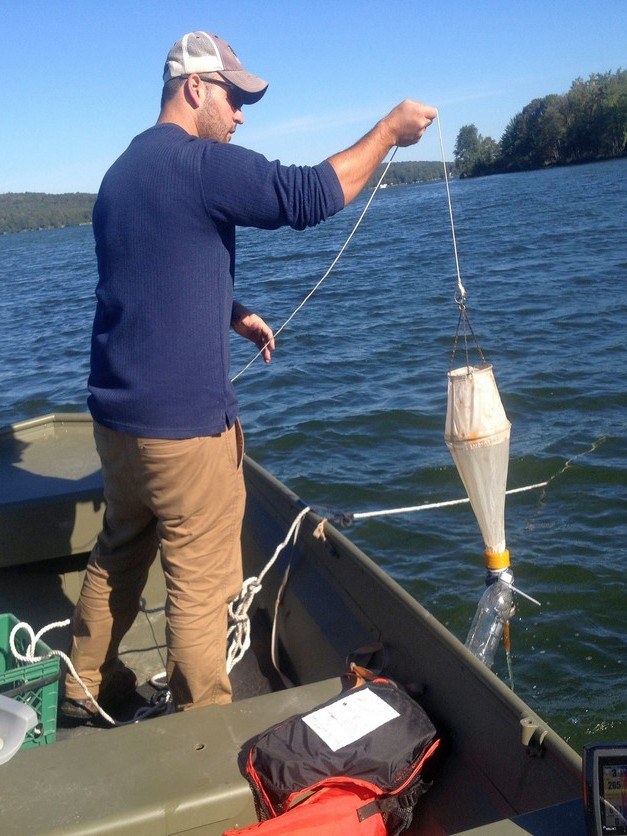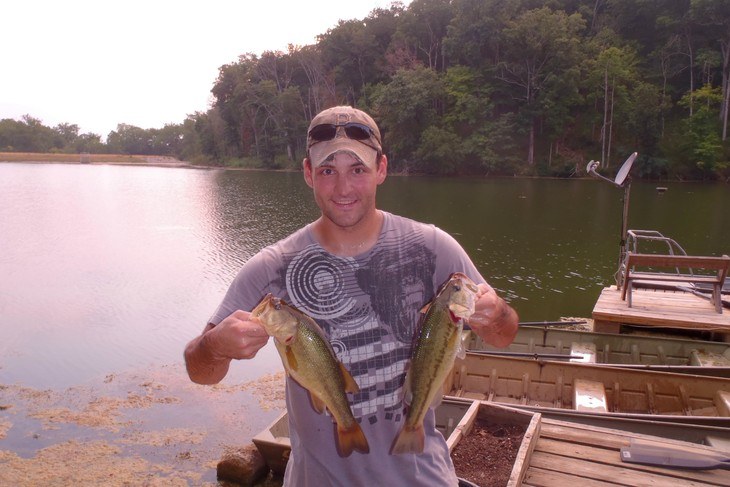Josh Mulhollem (B.S. Wildlife and Fisheries Science, 2008) applies ecology and public outreach to control the spread of aquatic invasive species

Josh Mulhollem uses zooplankton nets to monitor the larval form of invasive zebra and quagga mussels and to check for the presence of spiny waterflea, an invasive zooplankton recently discovered in Lake Champlain. Image: Courtesy of Josh Mulhollem
by Amanda Yeager September 23, 2016
Josh Mulhollem remembers his fascination with aquatic resources beginning at an early age. The son of an avid outdoorsman, Mulhollem spent much of his youth in central Pennsylvania developing the same passion. "I loved the outdoors and anything water-related, including fishing and walking around wetlands when we were camping, as well as catching frogs, turtles and anything that squirmed."
At the time, the young outdoor enthusiast didn't realize his interests would lead him to a career in ecology - one that would take Mulhollem to four states and develop his dedication to protecting aquatic habitats from invasive species.
A science foundation
When it came time to select a college, Mulhollem recalled, Penn State's wildlife and fisheries science program seemed a natural choice, though at the time he wasn't sure exactly how he would apply his degree. When he began his fisheries management classes, his professional interests began to take shape.
"The curriculum was very real-world focused. It taught me how complex and multidimensional the fields of fisheries management and aquatic ecology are. Before that I'd never thought of a lake or river as having social components as well as ecological and economic components. Management means considering all three."
Mulhollem also applied his classroom education and honed his fieldwork skills as a research technician for a Penn State trout-movement study led by Bill Sharpe, now professor emeritus of forest hydrology. Mulhollem says the experience showed him what it meant to be an aquatic ecologist, implementing tools of the trade such as electrofishing, behavioral observations and stream measurements - skills that served him well in his career endeavors.
After graduating from Penn State in 2008, Mulhollem wanted to expand his aquatic research credentials and experience a new ecological region, so he decided to pursue his master's degree in natural resources and environmental sciences at the University of Illinois. "The idea of sticking with another land-grant, Big Ten school appealed to me, since I had already had a good experience with that quality of education."

Mulhollem holds two largemouth bass caught during an electrofishing survey of a small lake in eastern Illinois, as part of his master's research. Image: Courtesy of Josh Mulhollem
Mulhollem's graduate research led him to publish two journal articles on thermal conditions in Midwestern power plant reservoirs, and the potential for these manmade lakes to model warming climate effects on species, including largemouth bass. While at the university, he also assisted with a research project on invasive Asian carp in the Illinois River. The project introduced Mulhollem to the discipline of invasive species management, which quickly came in handy in 2013 when he applied for the position of regional aquatic invasive species supervisor for the Wyoming Game and Fish Department.
"In a lot of ways, I got into this field of aquatic ecology by complete accident," said Mulhollem. "And it turned out to be the perfect thing for me."
Ecological challenges and opportunities
For the next two years, Mulhollem coordinated a team of technicians who inspected watercraft for invasive species and educated the public on invasive species - and frequented Wyoming's renowned fly fishing streams in his spare time. When a new opportunity arose last year to combine his aquatic ecology and public outreach skills, he was prepared. In 2015, he assumed his current position as an aquatic invasive species biologist for the Vermont Department of Environmental Conservation.
The state's invasive species program addresses harmful, non-native species that threaten the ecology of Vermont's inland lakes and waterways, including its largest water body, Lake Champlain. The lake has become the unfortunate host of invasive species such as the zebra mussel and spiny water flea, which can significantly change lake ecology and food chains, and Eurasian watermilfoil, a densely growing invasive plant that impedes lake recreation for boaters and swimmers. With many impacts occurring below the water's surface, monitoring aquatic invasive species can require a different approach than in a terrestrial environment, but Mulhollem has identified opportunities in an aquatic realm.

Mulhollem and an environmental technician examine sediment samples for the presence of aquatic invasive mollusks in Lake Bomoseen in western Vermont. Image: Courtesy of Josh Mulhollem
"Aquatic ecosystems have finite edges, especially discrete water bodies like lakes," he said. We can identify which lakes a species has, and has not, reached. And the great thing is that there are so many people who care deeply about their local aquatic environment. As a fisherman, I can relate. There are certain streams and lakes I care deeply about. We meet people who are protective and passionate about their aquatic resources, and it's very encouraging."
Educating the public
Mulhollem describes the field of aquatic invasive species management as having different characteristics from many other aquatic sciences - prevention and outreach are key activities, and inherently it's about fighting an uphill battle - but he couldn't be happier in his career choice.
"It's a fun, rewarding, challenging and sometimes unpredictable field, and I find I really enjoy that," said Mulhollem. "My favorite thing is the multidimensional aspect of the job. Some days I'm an outreach specialist. Some days I'm a public relations person. Some days I'm an aquatic ecologist. Some days I'm a fisheries biologist. Some days I need to be all of those things at once."
In tandem with another biologist whose focus is invasive plants, Mulhollem's statewide duties include monitoring the impacts of existing invasive populations, organizing efforts to impede the spread of invasives, and educating community members about their essential role in invasive species management. He organizes lakeside signage, educational materials and community presentations to help people identify and understand invasives.
Vermont also sponsors boat-wash stations to help recreationists ensure they do not transport materials from infested to noninfested lakes on their watercraft. And Mulhollem trains the state's public access greeters, a contingent of community members locally employed to provide invasives education at public lake access points.
"The adage that 'an ounce of prevention is worth a pound of cure' is very true in invasive species management. Once you have a species somewhere, they're almost impossible to eradicate, so we focus resources on ensuring they don't spread," explained Mulhollem. "The best tool we have in spread prevention is outreach and public education."
Mulhollem's goal is to reach all possible audiences, even those who don't directly use water resources for recreation. His work has taught him that invasive species truly can affect everyone in a community - from the ecological, drinking water and recreational impacts to potential economic factors such as increased water-treatment costs and downturns in lakefront property values.
Thoughts for tomorrow's ecologists
Looking back at the varied work experiences he's had since attending the College of Agricultural Sciences, Mulhollem believes there is great opportunity for aspiring professionals studying in the natural-resource and ecological sciences.
"When we were in school, most of my colleagues and I didn't know we'd be doing the things we are. We didn't know that there were options like aquatic invasive species biologist jobs or fisheries consultant jobs," he said.
"My advice is to expose yourself to as many aspects of the field as possible, whether that's in after-school clubs or work experiences. There are so many opportunities at Penn State you can take advantage of. You'll thank yourself in 10 years, I promise you."

